Serviços Personalizados
Artigo
Indicadores
Links relacionados
-
 Citado por Google
Citado por Google -
 Similares em Google
Similares em Google
Compartilhar
Journal of Student Affairs in Africa
versão On-line ISSN 2307-6267
versão impressa ISSN 2311-1771
JSAA vol.11 no.1 Cape Town 2023
http://dx.doi.org/10.24085/jsaa.v11i1.4121
RESEARCH ARTICLE
The psychological burden of the Covid-19 pandemic among students at a university of technology in South Africa
Andile Samkele MasukuI; Maureen Nokuthula SibiyaII; Reggiswindis Thobile HlengwaIII; Naseem HaniffIV
IDurban University of Technology, Durban, South Africa. Email: AndileM3@dut.ac.za. ORCid: 0000-0002-7850-5469
IIMangosuthu University of Technology, Umlazi, South Africa. Email: sibiya.nokuthula@mut.ac.za. ORCid: 0000-0003-1220-1478
IIIDurban University of Technology, Durban, South Africa. Email: Thobileh@dut.ac.za. ORCid: 0000-0001-8436-9451
IVDurban University of Technology, Durban, South Africa. Email: haniffn@dut.ac.za
ABSTRACT
The closure of universities as a response to the ongoing Covid-19 pandemic affects all students and has a far-reaching economic and psychosocial impact, especially for those students who come from marginalized and impoverished contexts. International research reports that students have struggled to cope with learning under unprecedented conditions, including not attending classes on campus. This study aimed to investigate the psychological burden of Covid-19 among students at a university of technology in the KwaZulu-Natal province in South Africa. A mixed-method approach was used to collect data from participants. The results revealed that several students struggled to cope, both mentally and academically, with the burden of Covid-19. Negative psychological experiences emerged among students as they faced numerous challenges. Therefore, it is recommended that students must be provided with resources that would enable them to thrive and recover from these negative experiences.
Keywords: Coronavirus disease, mental health problems, pandemic, psychological burden, student affairs
RÉSUMÉ
La fermeture des universités en réponse à la pandémie de Covid-19 actuelle affecte tous les étudiants et a un impact économique et psychosocial considérable, en particulier pour ceux issus de milieux marginalisés et appauvris. Les études internationales montrent que les étudiants ont eu du mal à faire face à l'apprentissage dans des conditions sans précédent, y compris en n'assistant pas aux cours sur le campus. Cette étude avait pour but d'examiner le poids psychologique de la Covid-19 chez les étudiants d'une université de technologie de la province de KwaZulu-Natal en Afrique du Sud. Une approche mixte a été utilisée pour collecter des données auprès des participants. Les résultats ont révélé que plusieurs étudiants avaient du mal à faire face au fardeau de la Covid-19 tant sur le plan mental que sur le plan académique. Des expériences psychologiques négatives ont été observées chez les étudiants alors qu'ils faisaient face à de nombreux défis. Par conséquent, il est recommandé de fournir aux étudiants les ressources nécessaires qui leur permettraient de s'épanouir et de se remettre de ces expériences négatives.
Mots-clés: Maladie à coronavirus, œuvres estudiantines, problèmes de santé mentale, pandémie, poids psychologique, services étudiants
Introduction
In late December 2019, a viral outbreak was first reported in Wuhan, China (Xu et al., 2020). Within a matter of weeks, severe acute respiratory syndrome coronavirus 2 (SARS-CoV-2) had already taken on pandemic proportions globally (Remuzzi & Remuzzi, 2020). The World Health Organization (2020) revealed that the virus, SARS-CoV-2, causes the novel Covid-19 disease. The most likely ecological reservoirs for SARS-CoV-2 are bats, but it is believed that the virus jumped the species barrier to humans from another intermediate animal host. The fact that little is known about this virus, resulted in fear.
The COVID-19 outbreak has affected many people around the globe, with ever-increasing numbers of confirmed deaths (Evans, 2020). This infection has become a pandemic even though countries and organizations have taken various preventive measures, such as social distancing (Rajapakse, 2020). Research has revealed that such measures have caused disruptions to daily routines (Lee, 2020) resulting in profound and a broad spectrum of negative impacts on people's psychological well-being (Ho et al., 2020). Cullen et al. (2020) report that during the outbreak of infectious disease, peoples' psychological reactions play an important role in shaping both the spread of the disease and the occurrence of emotional distress and social disorder, during and after the outbreak.
Furthermore, whilst Covid-19 disrupted public health, the impact on higher education institutions was momentous (Krishnamurthy, 2020). Specific to higher education, the global lockdown of educational institutions has negatively impacted the academic programme for students (Burgess & Sievertsen, 2020), with over 90% of the world's student population being affected (UNESCO, 2020). Indeed, Du Plessis et al. (2022) suggest that after the changes brought about by the Covid-19 pandemic in higher education, there is a need for integrated thinking which will forge a way forward. However, Kee (2021) argues that the need for higher education leaders to prepare for a crisis is evident more than ever as the response to Covid-19 has required drastic changes in the way education is delivered. Moreover, the growing trend of high levels of untreated psychological distress among students during the Covid-19 pandemic suggests a need for prevention programmes (Theurel et al., 2022). Thus, this study explored the psychological experiences of students during the Covid-19 pandemic and produced recommendations on interventions that would assist them to deal with psychological issues.
The objectives of the study were:
1. To examine the psychological impact of Covid-19 among students attending a university of technology in KwaZulu-Natal, South Africa.
2. To identify the mechanisms that students use to cope with the psychological impact of Covid-19.
Covid-19 and higher education
Available research reports that several students experienced some form of psychological distress during the peak of the Covid-19 pandemic (Mudenda, 2022). Within this context, as Nimnee and Halim (2021) argue, Covid-19 has not only affected public health but has had a measurable impact on education as it has culminated in unprecedented learning experiences. The pandemic has negatively transformed the daily lives of students in a variety of ways; including being blocked from physically accessing campuses, losing out on financial and internship opportunities, and forcing them to embrace the use of modern technologies for doing their academic work (Govindarajan & Srivastava, 2020). Further, the pandemic has introduced what has been termed the 'new normal', which, according to Dwivedi et al. (2020), radically transformed the higher education terrain. In this so-called 'new normal', universities shifted from face-to-face learning to a more online-oriented type of learning as one of the prevention measures against the spread of the virus (Rashid & Yadav, 2020). Yet, this move presented several challenges. For example, online learning affected student-lecturer and student-student interactions which have historically promoted better in-class engagements (Kumar et al., 2021). UNESCO (2022) has also revealed that the move to online learning affected students' academic performance. Some students dropped out of university because of a lack of consultation between them and their lecturers when they faced difficulties in learning/ understanding content-related material (Sintema, 2020). Linked to online teaching and learning challenges were issues such as internet availability, speed and cost, as well as the availability of devices such as laptops and cell phones that students needed to access learning resources and materials (Mahdy, 2020).
The psychological impact of Covid-19
Kara (2022) confirms that the Covid-19 pandemic has affected not only the physical health of students, but their mental health as well, mostly due to lockdown restrictions and the overwhelming numbers of positive cases reported each day (Jhunjhunwala & Jain, 2022). Historically, health-related pandemics have produced negative psychological outcomes including symptoms of depression, anxiety, the fear of death, posttraumatic stress disorder, and other psychotic symptoms (Taylor, 2022). University students have not been exempted from mental health challenges amid the Covid-19 pandemic (Odriozola-González et al., 2020). For example, some students have experienced reduced motivation toward their studies, pressure to learn independently, and an abandonment of their daily routines (Grubic, Badovinac & Johri, 2020). One study, conducted by Batra et al. (2021), found that there is a need for the development of appropriate public health interventions to address students' emotional and psychosocial needs during the Covid-19 pandemic. It is for this reason that the study reported in this article was conceptualised.
Method
This study employed a mixed-method approach to gather data from university students at one university of technology in KwaZulu-Natal, South Africa.
Participants
An invitation to participate in the study was sent through the university's communication channels to 33,000 students. These students were asked to voluntarily complete an online survey. A self-selected sample of 418 students completed the survey. The table below summarises the participants' demographic details.
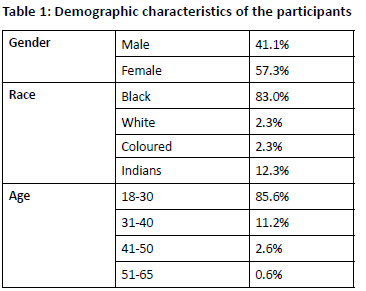
Instruments
A survey was used to investigate the psychological burden of the Covid-19 pandemic among students at one university of technology. The questionnaire had four sections. The first section requested students to provide their demographic details. Whereas the second section was based on the students' psychological experiences by investigating how the loss of a job by a primary breadwinner at home affected students, the psychological experiences of students, how the closure of university campuses affected the students, and students' feelings when asked to vacate university residences (qualitative approach). The third section focused on the challenges experienced by students because of the Covid-19 pandemic. This section investigated whether or not students were able to do their academic work during Covid-19, whether students could socialize, and other challenges which they may have experienced because of Covid-19 (quantitative and qualitative approach). The fourth section was based on coping mechanisms that students used to deal with their psychological experiences. This particular section also focused on which programmes students would recommend being implemented to deal with the psychological issues resulting from Covid-19 and the kind of support the university may need to offer students in dealing with such issues (quantitative approach). Students' responses were based on a 5-scale model which ranked their responses on a continuum from strongly agree, agree, neutral, disagree, and strongly disagree. Moreover, since this is a new study and has not been conducted before, the researchers developed the questionnaire; thus, the questionnaire was not adopted from any other previous or known research study.
Procedure
The researchers first directly approached a sample of six (6) students to participate in a pilot study. The purpose of the pilot study was to ascertain the feasibility of the proposed study to the larger student population. The findings of the pilot study were analysed; however, they were not included in this study.
Ethical considerations
After receiving ethical clearance from the Institutional Research and Ethics Committee (IREC), gatekeeper permission was thereafter sought from the University Gatekeeper Permission Committee. All respondents in the study were provided with a letter of information that outlined the purpose of the study and an electronic consent form to sign to participate in the research study. Students were informed that their participation was voluntary and that their details would not be used in the study, as confidentiality would be maintained.
Data analysis
In the process of data cleaning, we found that 418 responses were received, 12 of these were excluded as they did not give consent to participate in the study. A further 23 were duplicates (respondents submitted more than once) and were removed. Therefore, this left 338 usable responses. Data were imported into Statistical Package for the Social Sciences (SPSS) version 20 for analysis. Descriptive and frequency analysis statistical tests were carried out to analyse the data for quantitative data. Data from the open-ended questions were analysed by way of thematic analysis in which the participants' responses were scrutinized and themes were identified.
Results
Section A: Demographics
Table 2 below shows that about 57.3% of the participants identified as female and 41.1% identified as male. The majority (83.0%) of the participants were Black students, with 17% of other races participating in this study. According to the data, a majority (73.6%) of the participants were undergraduate students and the rest (26.4%) were postgraduate students. The majority (85.6%) of the participants were in the age range of 18-30 years, and 58.5% of the students were from urban areas whilst 41.5% were from rural areas.
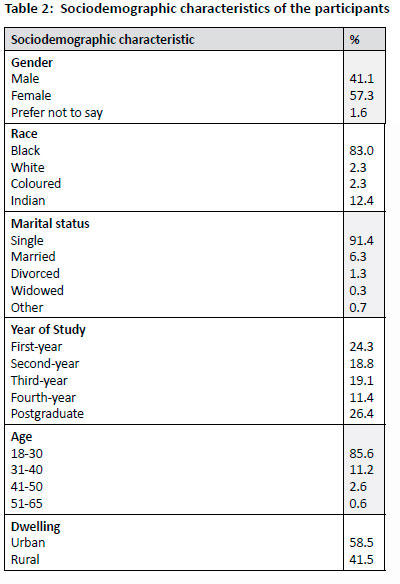
Section B: Psychological effects
Table 3 presents the results of respondents' opinions on being affected by a primary breadwinner's loss of employment because of the Covid-19 pandemic. Respondents were asked to rate their responses on a scale of 1 (strongly disagree) to 5 (strongly agree), that they were affected emotionally and mentally using five different emotions. The results show that a majority of the respondents were affected by a breadwinner's loss of a job. Most respondents strongly agreed that they were feeling stressed and emotionally drained, with a few indicating being mentally affected (2.6%) and feeling hopeless (2.9%), including a sense of disappointment (3.9%).
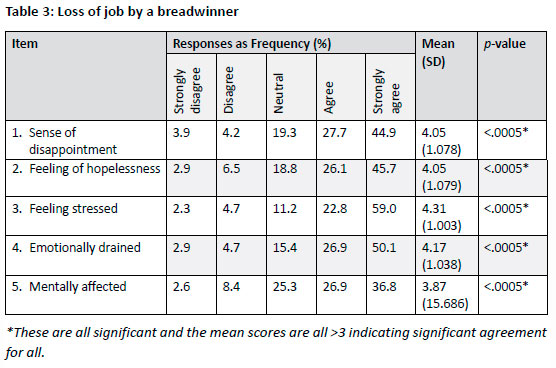
Table 4 shows the effect of the Covid-19 pandemic among the respondents. They were asked to rate their agreement, on a scale of 1 (strongly disagree) to 5 (strongly agree), that they were affected emotionally using five different emotions. The table shows the psychological experiences of the pandemic on respondents. The psychological experiences included feelings of anxiety, fear, depressive symptoms, mood swings and change of sleeping habits.
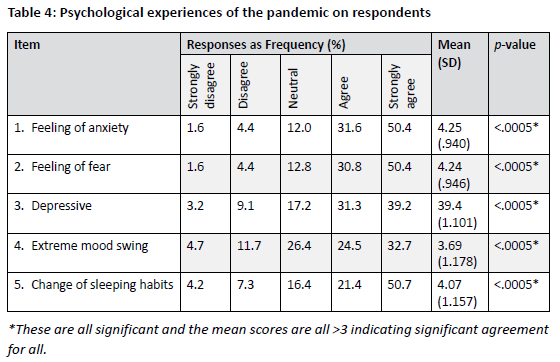
Table 5 presents the effect of campus closures on respondents. They were asked to rate their agreement on a scale of 1 (strongly disagree) to 5 (strongly agree) that they were affected by the campus closure. Table 5 shows that there is a significant difference in the psychological effect of closing campus across different race groups, p=.007. Results from paired analysis with a Bonferroni adjustment indicate that a majority of the respondents experienced anxiety about the future and some were not able to concentrate. Further, others had mental breakdowns, with a minority suggesting that they had no access to online teaching and learning.
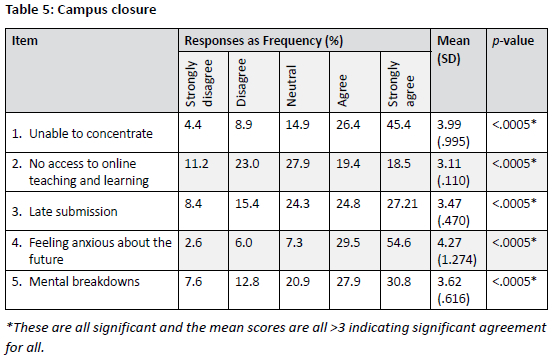
Table 6 presents students' feelings regarding the time they were asked to vacate university residences. Respondents were asked to rate their agreement, on a scale of 1 (strongly disagree) to 5 (strongly agree), that they were affected emotionally using five different emotions. There is a significant difference in the psychological effect of having to vacate their residence across different races, p<.0005. Results from paired analysis with a Bonferroni adjustment indicate that the effect was greater for Black students than for Indian students, p<.0005.
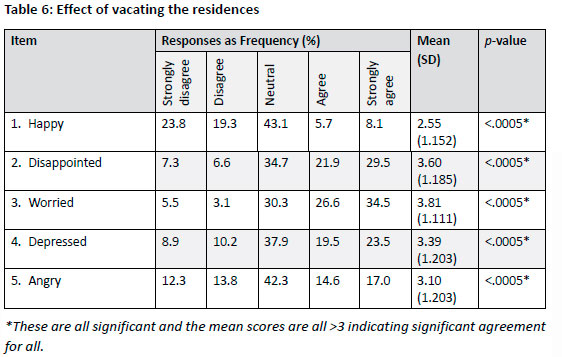
Section C: Challenges experienced
Table 7 describes the responses of participants regarding their ability to do their academic work during the pandemic. The results indicate that a majority of respondents were able to do their academic work, with a minority suggesting that they were not able to do their academic work during the pandemic.

When asked if they could do their academic work during the pandemic, the results from a binomial test showed that a significant 76% were able to do their academic work, p<.0005.
Table 8 presents results about respondents' ability to socialize with other people during the pandemic. Students were asked to rate their agreement, on a scale of 1 (strongly disagree) to 5 (strongly agree), that they were able to socialize or create relationships (Table 7). Results from paired analysis with a Bonferroni adjustment indicate that most of the respondents had social withdrawal symptoms.
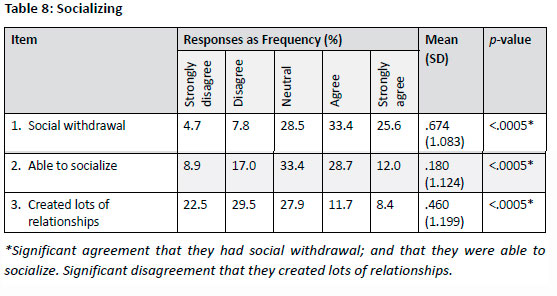
Other challenges (qualitative)
Respondents were asked about other challenges that they experienced during the pandemic. The themes that emerged were grouped and analysed to describe the challenges. The themes that emerged from our analysis were as follows:
Theme 1: Connectivity issues
Some of the students indicated that they had connectivity issues and they struggled to access online teaching and learning activities.
Theme 2: Data
Students indicated that they had problems obtaining and purchasing data to keep themselves connected to online platforms. Thus, they were not able to do their assignments or access to their study materials.
Theme 3: Loss of confidence
Some students reported a loss in self-confidence and a lack of motivation to do their lessons, resulting in the untimely submission of their work.
Theme 4: Consultation with lecturers
Other students mentioned that they experienced challenges in reaching out to their lecturers especially when they needed clarity regarding topics or content they did not understand during the teaching and learning sessions.
Theme 5: Access to campus
Some students faced difficulty accessing laboratories on campus, which hampered the continuation and completion of their projects.
Theme 6: Environment factors
Students reported challenges with their living arrangements at home because the space was not conducive for them to do their academic work effectively.
Section D: Coping mechanisms
Table 9 shows participants' coping mechanisms during the pandemic. Respondents were asked to rate their agreement, on a scale of 1 (strongly disagree) to 5 (strongly agree), that they adopted coping mechanisms (Table 9). Results from paired analysis with a Bonferroni adjustment indicate that the majority were eating well and continued to connect with others. Whereas the minority maintained normal routines and read books as coping mechanisms.
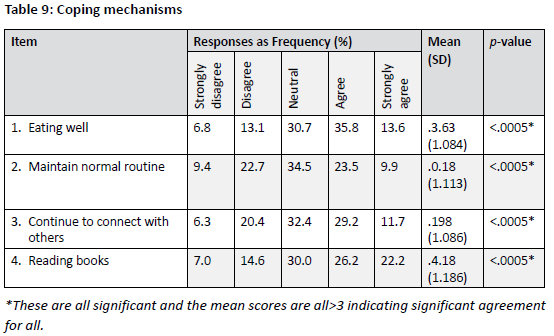
Table 10 shows the programmes that participants recommended for implementation by the university to assist them in dealing with psychological issues caused by the pandemic. They were asked to rate their agreement, on a scale of 1 (strongly disagree) to 5 (strongly agree), to recommend the implementation of these programmes by the university (Table 9). Results from paired analysis with a Bonferroni adjustment indicate that the majority of respondents needed programmes on improving social competencies and webinars on mental health. Whereas some agreed on having workshops on Covid-19 to assist them to deal with resultant psychological issues.
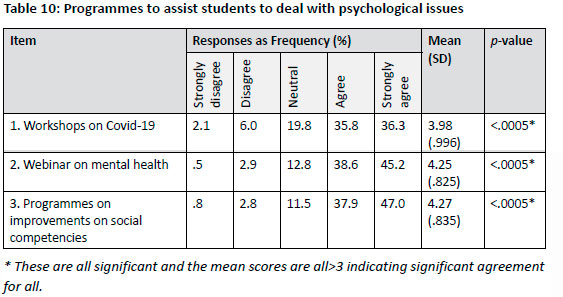
Table 11 shows the types of support that participants felt should be offered by the university. They were asked to rate their agreement, on a scale of 1 (strongly disagree) to 5 (strongly agree), if they needed psychosocial and academic support (Table 10). Results from paired analysis with a Bonferroni adjustment show that the majority of respondents indicated a need for webinars on mental health and workshops on Covid-19.
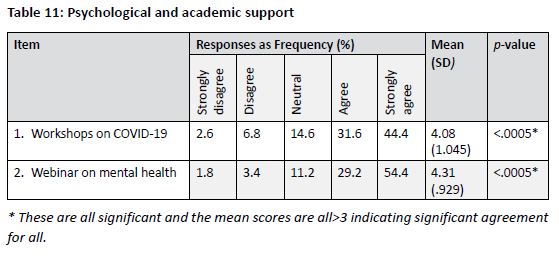
Discussion
This study investigated the psychological burden of Covid-19 among students at one university of technology in KwaZulu-Natal, South Africa. The first objective of this study was to investigate the psychological impacts of Covid-19 on students at the selected university of technology. The Covid-19 pandemic has caused a loss of employment opportunities, which impacted on livelihoods (Shang et al., 2021). The purpose of this objective was to investigate how household breadwinners' loss of employment psychologically affected students during the Covid-19 pandemic. This study confirms that the majority of breadwinners lost their jobs because of the pandemic, and this had a negative psychological impact on students.
The results also show that students had challenges with their mental health which included anxiety, feelings of fear, and depression. Visser & Law-van Wyk (2021) confirm that during the pandemic, students experienced emotional and mental health challenges. Moreover, this study also found that campus closure contributed to drops in academic performance by the students. This shows that some of the students struggled to cope with online-based methods of teaching and learning away from campus. The closure of campuses negatively impacted students' learning and well-being (Vlachos et al., 2021). The results suggest that vacating residences harmed students since they had insufficient resources to complete their academic work. Thus, it is suggested that the home environment affected students' learning and their well-being during Covid-19 (Agyekum, 2022).
The second objective was to investigate the challenges that students experienced related to the Covid-19 pandemic. The results show that most of the students were able to do their academic work, however, other students reported that they could not do their work as they experienced different challenges. Whitelaw et al. (2022) found that some students lacked data and learning devices which prevented them from completing their academic work. The study also found that Covid-19 had an impact on students' overall social relations as they experienced social withdrawal. Their face-to-face interactions were often limited and also lost during the Covid-19 pandemic (Long et al., 2021). Students were also asked about other challenges that they were experiencing. The results revealed that a minority of students had connectivity issues that prevented them from doing their academic work and having access to online classes. Further, these challenges contributed to some of the students losing confidence in themselves or their futures as they lost motivation to do their academic work. Thus, new techniques must be implemented to support students to do their academic work. The study also found that some of the students experienced challenges related to consulting with their lecturers. The pandemic contributed to reduced contact time and a lack of consultation when students faced challenges in learning or understanding (Sintema, 2020).
Another objective of the study was to identify mechanisms that students used to cope with Covid-19. A majority of the students agreed that there should be programmes implemented by the institution to assist them in coping with mental health problems, especially since the Covid-19 pandemic is ongoing. These programmes must be implemented to effectively address the psychological and other academic-related issues they faced with Covid-19. Therefore, based on the above discussion, an overarching finding is that the Covid-19 pandemic has had an impact on students' psychological well-being which was embedded in economic, educational, and social factors.
Limitations
This study employed a mixed-method approach with limited close-ended questions which prevented researchers from further exploring the psychological effects of Covid-19 among students. A notable limitation was that there were no follow-up questions based on the responses that students provided. This limited the scope of our analysis, and the implications derived therefrom. Likewise, this study was conducted at a single university of technology. Therefore, the results are not generalisable to other universities in South Africa.
Conclusion
This study has provided a snapshot of how Covid-19 psychologically affected students at a university of technology in South Africa. The suspension of in-contact classes by institutions to prevent the spread of the virus resulted in students being concerned about their academic performance and their psychological well-being. Further, the closure of campuses and residences had implications on students' academic progress as some of them had network connectivity issues and others had no data to access online classes which were likely to negatively impact their emotional and mental health wellness. Also, based on the results presented above, some of the students were able to cope and managed through these challenges using various coping mechanisms.
Although students indicated their coping methods, the results point to a need for ameliorative programmes aimed at assisting students to deal with the psychological impact of Covid-19. The university should, thus, strengthen its systems and processes by putting appropriate interventions to help students deal with such issues. Mental health is one of the important aspects that should be taken seriously in making sure that no student is suffering. Further, it is also vital to provide accurate resources that would enable students to perform their academic work without any disruption. Academic support is important if we want to assist students in striving for academic excellence. This also calls for the university to create an enabling environment where students are co-creators of programmes that will positively influence their development and growth in all spheres of life. Therefore, future research needs to look at universities' role in providing psychological support to students during public health emergencies.
Ethics statement
All ethics protocols were followed by the researchers.
Potential conflict of interest
The authors have no conflict of interest to disclose.
Funding
No funding was received to conduct the study.
References
Agyekum, B. (2022). Adult student perspectives toward housing during COVID-19. Wellbeing, Space and Society, 3, 1-7. https://www.sciencedirect.com/science/article/pii/S266655812200015X [ Links ]
Akat, M., & Karatas, K. (2020). Psychological effects of COVID-19 pandemic on society and its reflections on education. Electronic Turkish Studies, 15(4), 1-13. [ Links ]
Atalan, A. (2020). Is the lockdown important to prevent the COVID-19 pandemic? Effects on psychology, environment and economy-perspective. Annals of Medicine and Surgery, 56, 38-42. [ Links ]
Banerjee, D., & Rai, M. (2020). Social isolation in Covid-19: The impact of loneliness. International Journal of Psychiatry, 66(6), 525-527. [ Links ]
Batra, K., Sharma, M., Batra, R., Singh, T. P., & Schvaneveldt, N. (2021). Assessing the psychological impact of COVID-19 among college students: An evidence of 15 countries. Healthcare, 9(2), 1-18. [ Links ]
Browning, M. H., Larson, L. R., Sharaievska, I., Rigolon, A., McAnirlin, O., Mullenbach, L., Cloutier, S., Vu, T. T., Thomsen, J., Reigner, N., Metcalf, E. C., D'Antonio, A., Helbich, M., Bratman, G., N., & Alvarez, H. O. (2021). Psychological impacts from COVID-19 among university students: Risk factors across seven states in the United States. PLOS ONE, 16(1), e0245327. [ Links ]
Bryson, J. R., & Andres, L. (2020). Covid-19 and rapid adoption and improvisation of online teaching: Curating resources for extensive versus intensive online learning experiences. Journal of Geography in Higher Education, 44(4), 608-623. [ Links ]
Burgess, S., & Sievertsen, H. H. (2020). Schools, skills, and learning: the impact of COVID-19 on education. VOXEU, CEPR. https://voxeu.org/article/impact-covid-19-education
Check, J., & Schutt, R. K. (2012). Survey research: Research methods in education. Sage Publications.
Chen, Q., Liang, M., Li, Y., Guo, J., Fei, D., Wang, L., He, L., Sheng, C., Cai, Y., Li, X., & Wang, J. (2020). Mental health care for medical staff in China during the COVID-19 outbreak. Lancet Psychiatry, 7(4), 15-16. [ Links ]
Cullen, W., Gulati, G., & Kelly, B. D. (2020). Mental health in the Covid-19 pandemic. QJM: An International Journal of Medicine, 113(5), 311-312. [ Links ]
Dang, H. A. H., & Nguyen, C. V. (2021). Gender inequality during the COVID-19 pandemic: Income, expenditure, savings, and job loss. World Development, 1-10. https://doi.org/10.1016/j.worlddev.2020.105296
Du Plessis, M., Jansen van Vuuren, C. D., Simons, A., Frantz, J., Roman, N., & Andipatin, M. (2022). South African higher education institutions at the beginning of the Covid-19 pandemic: Sense-making and lessons learnt. Frontiers in Education, 6, 1-17. https://www.frontiersin.org/articles/10.3389/feduc.2021.740016/full [ Links ]
Dutta, S., & Smita, M. K. (2020). The impact of COVID-19 pandemic on tertiary education in Bangladesh: students' perspectives. Open Journal of Social Sciences, 8(09), 53-68. [ Links ]
Dwivedi, Y. K., Ismagilova, E., Hughes, D. L., Carlson, J., Filieri, R., Jacobson, J., & Wang, Y. (2021). Setting the future of digital and social media marketing research: Perspectives and research propositions. International Journal of Information Management, 59, 1-37. [ Links ]
Ellepola, A., & Rajapakse, R.P. (2020). The foreseeable psychological impact of COVID 19 in Sri Lanka [Preprint]. https://www.researchgate.net/publication/340522703_Foreseeable_psychological_impact_of_COVID_19_in_Sri_Lanka
Evans, O. (2020). Socio-economic impacts of novel coronavirus: The policy solutions. BizEcons Quarterly, 7, 3-12. [ Links ]
Fathoni, A., & Retnawati, H. (2021). Challenges and strategies of postgraduate students in online learning during the Covid-19 pandemic. Journal Prima Edukasia, 9(2), 1-12. [ Links ]
Govindarajan, V., & Srivastava, A. (2020). What the shift to virtual learning could mean for the future of higher education. Harvard Business. https://hbr.org/2020/03/what-the-shift-to-virtual-learning-could-mean-for-the-future-of-higher-ed
Grubic, N., Badovinac, S., & Johri, A. M. (2020). Student mental health in the midst of the COVID-19 pandemic: A call for further research and immediate solutions. International Journal of Social Psychiatry, 66(5), 517-518. [ Links ]
Ho, C. S., Chee, C., Y., & Ho, R. C. (2020). Mental health strategies to combat the psychological impact of COVID-19 beyond paranoia and panic. Annals Academy of Medicine Singapore, 49(1), 1-3. [ Links ]
Jhunjhunwala, S., & Jain, A. (2022). The psychological impact of the Covid-19 pandemic on college students in Mumbai. Journal of Positive School Psychology, 6(7), 1395-1400. [ Links ]
Kara, B. (2022). Understanding the psychological impact of the COVID-19 pandemic on university students. AIMS Medical Science, 9(1), 1-4. [ Links ]
Kee, C. E. (2021). The impact of COVID-19: Graduate students' emotional and psychological experiences. Journal of Human Behavior in the Social Environment, 33(1-4), 476-488. [ Links ]
Krishnamurthy, S. (2020). The future of business education: A commentary in the shadow of the Covid-19 pandemic. Journal of Business Research, 117, 1-5. https://doi.org/10.1016/j.jbusres.2020.05.034 [ Links ]
Kumar, A., Sarkar, M., Davis, E., Morphet, J., Maloney, S., Ilic, D., & Palermo, C. (2021). Impact of the COVID-19 pandemic on teaching and learning in health professional education: a mixed methods study protocol. BMC Medical Education, 21(1), 1-7. [ Links ]
Lee, J. (2020). Mental health effects of school closures during COVID-19. Lancet Child & Adolescent Health, 4(6), 421. [ Links ]
Li, S., Wang., Y, Xue, J., Zhao, N., & Zhu, T. (2020). The impact of COVID-19 epidemic declaration on psychological consequences: A study on active Weibo users. International Journal of Environmental Research and Public Health, 17(6), 1-9. [ Links ]
Li, W., Yang, Y., Liu, Z. H., Zhao, Y. J., Zhang, Q., Zhang, L., Cheung, T., & Xiang, Y. T. (2020). Progression of mental health services during the COVID-19 outbreak in China. International Journal of Biological Sciences, 16(10), 1732-1738. [ Links ]
Li, Z., Ge, J., Yang, M., Feng J., Qiao, M., Jiang, R., Bi, J., Zhan, G., Xu, X., Wang, L., & Zhou, Q. (2020). Vicarious traumatization in the general public, members, and non-members of medical teams aiding in COVID-19 control. Brain, Behavior, and Immunity, 88, 916-919. [ Links ]
Long, E., Patterson, S., Maxwell, K., Blake, C., Pérez, R. B., Lewis, R., McCann, M., Riddell, J., Skivington, K., Wilson-Lowe, R., & Mitchell, K. R. (2021). COVID-19 pandemic and its impact on social relationships and health. Journal of Epidemiology and Community Health, 76(2), 128-132. [ Links ]
Mahdy, M. A. (2020). The impact of COVID-19 pandemic on the academic performance of veterinary medical students. Frontiers in Veterinary Science, 7, 1-8. https://doi.org/10.3389/fvets.2020.594261 [ Links ]
Mudenda, S., Chomba, M., Mukosha, M., Daka, V., Chileshe, M., Okoro, R. N., Fadare, J., Al-Fayyadh, S., Munsaka, S., Kampamba, M., Chali, J., Mfune, R. L., & Hikaambo, C. N. A. (2022). Psychological impact of coronavirus disease (COVID-19) on health professions students at the University of Zambia: A cross-sectional study. The Pan African Medical Journal, 42, 1-12. https://panafrican-med-journal.com/content/article/42/237/pdf/237.pdf [ Links ]
Nimnee, N. N., & Halim, A. (2021). Impact of COVID-19 on higher education system: University student's perspective. Journal of International Education and Practice, 4(1), 1-16. [ Links ]
Odriozola-González, P., Planchuelo-Gómez, Á., Irurtia, M. J., & de Luis-García, R. (2020). Psychological effects of the COVID-19 outbreak and lockdown among students and workers of a Spanish university. Psychiatry Research, 290, 113108. [ Links ]
Rashid, S., & Yadav, S. S. (2020). Impact of Covid-19 pandemic on higher education and Research. Indian Journal of Human Development, 14(2), 340-343. [ Links ]
Remuzzi, A., & Remuzzi G. (2020). COVID-19 and Italy: What next? Lancet Respiratory Medicine, 395, 1225-1228. [ Links ]
Shang, Y., Li, H., & Zhang, R. (2021). Effects of pandemic outbreak on economies: evidence from business history context. Frontiers in Public Health, 9, 1-12. https://www.frontiersin.org/articles/10.3389/fpubh.2021.632043/full [ Links ]
Sintema, E. J. (2020). Effect of COVID-19 on the performance of grade 12 students: Implications for STEM education. EURASIA Journal of Mathematics, Science and Technology Education, 16(7), 133-141. [ Links ]
Taylor, S. (2022). The psychology of pandemics. Annual Review of Clinical Psychology, 18, 581-609. https://coronaphobia.org/assets/articles/taylor-arcp.pdf [ Links ]
Thai, T. T., Le, P. T. V., Huynh, Q. H. N., Pham, P. T. T., & Bui, H. T. H. (2021). Perceived stress and coping strategies during the COVID-19 pandemic among public health and preventive medicine students in Vietnam. Psychology Research and Behavior Management, 14, 795-804. https://www.dovepress.com/perceived-stress-and-coping-strategies-during-the-covid-19-pandemic-am-peer-reviewed-fulltext-article-prbm [ Links ]
Theurel, A., Witt, A., & Shankland, R. (2022). Promoting university students' mental health through an online multicomponent intervention during the COVID-19 pandemic. International Journal of Environmental Research and Public Health, 19(16), 1-15. https://www.mdpi.com/1660-4601/19/16/10442 [ Links ]
(UNESCO) United Nations Educational, Scientific and Cultural Organization. (2020). COVID-19 educational disruption and response. UNESCO, Paris.
UNESCO. (2022). Resuming or Reforming? Tracking the global impact of the COVID-19 pandemic on higher education after two years of disruption. International Institute for Higher Education in Latin America and the Caribbean. https://www.iesalc.unesco.org/en/2022/06/03/the-impact-of-covid-19-in-higher-education/
Venkatesh, A., & Edirappuli, S. (2020). Social distancing in covid-19: What are the mental health implications? BMJ, m1379.
Visser, M., & Law-van Wyk, E. (2021). University students' mental health and emotional wellbeing during the COVID-19 pandemic and ensuing lockdown. South African Journal of Psychology, 51(2), 229-243. [ Links ]
Vlachos, J., Hertegárd, E., & B. Svaleryd, H. (2021). The effects of school closures on SARS-CoV-2 among parents and teachers. Proceedings of the National Academy of Sciences, 118(9), 1-7. https://www.pnas.org/doi/pdf/10.1073/pnas.2020834118 [ Links ]
Whitelaw, E., Branson, N., & Leibbrandt, M. (2022). Learning in lockdown: University students' academic performance during COVID-19 closures. Southern Africa Labour and Development Research Unit. https://www.opensaldru.uct.ac.za/bitstream/handle/11090/1021/2022_289_Saldruwp.pdf?sequence=1
(WHO) World Health Organization. (2020). Coronavirus disease 2019 (COVID-19) situation report - 32. WHO.
Xu, Z., Shi, L., Wang, Y., Zhang, J., Huang, L., Zhang, C., Liu, Z. H., Zhao, P., Liu, H., Zhu, L., & Tai, Y. (2020). Pathological findings of COVID-19 associated with acute respiratory distress syndrome: Lancet Respiratory Medicine, 8(4), 420-422. [ Links ]
Zhai, Y., & Du, X. (2020). Addressing collegiate mental health amid COVID-19 pandemic. Psychiatry Research, 288, 1-2. https://doi.org/10.1016/j.psychres.2020.113003 [ Links ]
Received 19 October 2022
Accepted 17 March 2023
Published 14 August 2023














